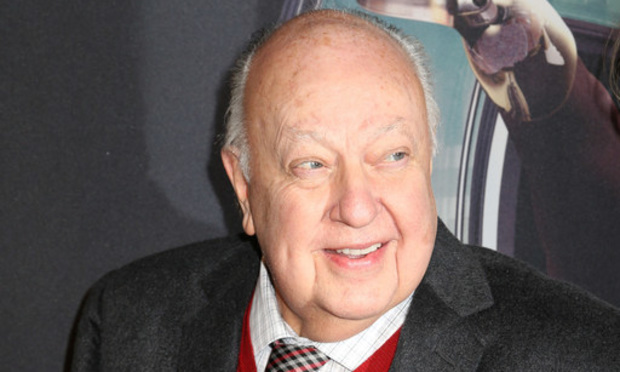Bernstein Litowitz Finds Role for Investors in Fight Against Sexual Harassment
Can the threat of investor litigation solve sexual harassment problems in the corporate world?
December 15, 2017 at 10:06 AM
26 minute read
 Roger Ailes, former CEO of Fox News.
Roger Ailes, former CEO of Fox News. At a time when troubling stories about sexual harassment appear in the media almost daily, the plaintiffs law firm Bernstein Litowitz Berger & Grossmann is wielding the threat of investor litigation to ensure that such behavior at public companies becomes unacceptable and that, when it does take place, company directors and officers will pay.
The firm used this tactic with 21st Century Fox Inc., the parent company of Fox News, after a number of women, including television host Gretchen Carlson, leveled harassment claims against former CEO Roger Ailes and, later, TV personality Bill O'Reilly. Armed with the force of a large institutional investor threatening a third-party derivative lawsuit, the firm got 21st Century Fox to agree to a settlement that requires the company to institute specific corporate governance reforms and compels its directors and officers, as well as the Ailes' estate, to pay $90 million through third-party insurers. The money would go back to the company for the benefit of shareholders.
The settlement, announced in November, could have a lasting impact on the fight against sexual harassment at Fox and elsewhere in corporate America.

“Our view was that … this would form a template for many other companies, public companies or otherwise, that are facing similar issues,” said Max Berger, a founding partner at Bernstein Litowitz who led the negotiations with Fox.
As part of the settlement, which still must be approved in Delaware Chancery Court, Fox established the Fox News Workplace Professionalism and Inclusion Council, which will report to the company's board for at least five years and can recommend reforms in the realm of human resources training and recruitment of women and minority employees, among other areas.
The council includes the heads of human resources at both 21st Century Fox and Fox News, as well as four outside experts on diversity and workplace inclusion issues, including former Manhattan federal judge Barbara Jones, now a partner at Bracewell focused on corporate monitorships.
Fox is required to post reports from the council to its website and to reference them in its annual reports. Once the five years are up, the company must also publicly explain whether and why it plans to discontinue the council's work or extend it.

Berger and Mark Lebovitch, who also played a leading role in the settlement negotiations, say the workplace inclusion council is important in the fight against institutional corporate sexual harassment. But the Fox settlement also involves a sizable amount of money—the $90 million payout from the company's officers and directors.
So how did Bernstein Litowitz manage to extract such a settlement from Fox? In July 2016, Gretchen Carlson filed a sexual harassment lawsuit against Ailes. Those charges were followed by harassment allegations against O'Reilly, who was fired from Fox News and denies the claims. But those cases, Berger said, brought revelations to light that Bernstein Litowitz believed could be grounds for a derivative lawsuit—a suit in which a shareholder effectively serves as a stand-in for the company itself and sues its board and executives for allegedly failing in their oversight roles.
Instead of filing a lawsuit right away, however, Bernstein Litowitz opted for a different approach. On behalf of an institutional investor client, City of Monroe (Michigan) Employees' Retirement System, the firm asserted Monroe's statutory right to make a “demand for books and records”—a shareholder's right under Delaware law to inspect a company's records. From there, the firm engaged with Fox outside of court, reaching agreements that allowed Bernstein Litowitz access to document-based discovery and depositions before, ultimately, the two sides reached a deal on the settlement announced in November.
Only then, on Nov. 20, the same day the settlement was announced and submitted to the court, did Bernstein Litowitz file a shareholder derivative complaint. This was largely a formality so the settlement could be approved.
Berger said keeping the dispute out of court until then had several benefits. For one, it allowed his firm and its investor client to avoid having to surmount the procedural hurdles that often accompany a derivative action. But it also created an environment in which the two sides could hold a constructive dialogue.
Another factor, Berger said, was that the sort of programmatic changes Bernstein Litowitz and its client were looking for with respect to Fox's corporate governance—namely, the council—couldn't really be pursued in a lawsuit. The potential relief in a court action would likely have been limited to money from the company's board and executives and maybe some form of an injunction.
Berger and Lebovitch also praised the other side's lawyers, in particular Gregory Varallo of Richards, Layton & Finger, and in-house Fox counsel Gerson Zweifach, saying they showed a willingness to negotiate and a high level of mutual trust that went a long way toward putting in place a well-credentialed council that would have a real, substantive oversight role. That approach to the negotiation by Fox's lawyers was instrumental in securing a resolution, said Berger, and in his view it required the Fox side to stick its neck out as it agreed to a settlement that went well beyond the typical.
“This is not a council that is designed to make Fox look good. … This is not without risk for them,” said Berger. Later, he added, “It took a certain amount of courage on the other side's part.”
Berger and Lebovitch both said they believe the Fox settlement is not a cure-all solution for addressing sexual harassment, especially in cases where there's a one-off set of allegations against a single person at a company. The situation at Fox, said Lebovitch, was egregious and widespread enough that it implicated the company's leadership.
“At Fox, you couldn't write it off to deviance. That's why it was a corporate issue,” said Lebovitch. “Our message to the company was: Look at this situation. You don't want to be justifying it or defending it.”
Still, he added that the settlement and the council it put in place could serve as a model for effecting change at other companies with widespread harassment or discrimination issues.
“My hope is that, Fox embracing the council, it really does send the message to other corporate boards,” Lebovitch said.
Meanwhile, Bernstein Litowitz gets more than the satisfaction that it helped make corporate America clean up its act. If the court approves the settlement, a portion of the $90 million payout would go to the law firm and its co-counsel in Delaware, Grant & Eisenhofer, in the form of legal fees.
Berger acknowledged the financial benefit that the case could provide to his firm. But he also distinguished the Fox case from other, more bread-and-butter work that the firm does in the securities class action realm. There, the cases by design have a monetary value—there's typically a corporate wrongdoing disclosed, a company's stock goes down by a certain amount, and that, in effect, creates the boundaries of a potential financial recovery for a shareholder lawsuit.
Those sorts of boundaries don't exist in cases such as the Fox matter, which seek from the outset to enact real changes at a company, rather than just recouping investor money. That, in turn, can make them riskier from the perspective of a plaintiffs firm because it wouldn't have as good a sense of the potential financial recovery going into the case.
But, Berger said, cases focusing on corporate governance reforms are important to his firm's client base in the institutional investor world. And beyond that, in Berger's view, they further what he sees as the underlying mission of his law firm—policing corporate wrongdoing.
“The heart of our client base cares about this stuff,” he said. “Given the right cases, you can do a tremendous amount of good.”
 Roger Ailes, former CEO of Fox News.
Roger Ailes, former CEO of Fox News. At a time when troubling stories about sexual harassment appear in the media almost daily, the plaintiffs law firm
The firm used this tactic with 21st Century
The settlement, announced in November, could have a lasting impact on the fight against sexual harassment at Fox and elsewhere in corporate America.

“Our view was that … this would form a template for many other companies, public companies or otherwise, that are facing similar issues,” said Max Berger, a founding partner at
As part of the settlement, which still must be approved in Delaware Chancery Court, Fox established the Fox News Workplace Professionalism and Inclusion Council, which will report to the company's board for at least five years and can recommend reforms in the realm of human resources training and recruitment of women and minority employees, among other areas.
The council includes the heads of human resources at both 21st Century Fox and Fox News, as well as four outside experts on diversity and workplace inclusion issues, including former Manhattan federal judge Barbara Jones, now a partner at Bracewell focused on corporate monitorships.
Fox is required to post reports from the council to its website and to reference them in its annual reports. Once the five years are up, the company must also publicly explain whether and why it plans to discontinue the council's work or extend it.

Berger and Mark Lebovitch, who also played a leading role in the settlement negotiations, say the workplace inclusion council is important in the fight against institutional corporate sexual harassment. But the Fox settlement also involves a sizable amount of money—the $90 million payout from the company's officers and directors.
So how did
Instead of filing a lawsuit right away, however,
Only then, on Nov. 20, the same day the settlement was announced and submitted to the court, did
Berger said keeping the dispute out of court until then had several benefits. For one, it allowed his firm and its investor client to avoid having to surmount the procedural hurdles that often accompany a derivative action. But it also created an environment in which the two sides could hold a constructive dialogue.
Another factor, Berger said, was that the sort of programmatic changes
Berger and Lebovitch also praised the other side's lawyers, in particular Gregory Varallo of
“This is not a council that is designed to make Fox look good. … This is not without risk for them,” said Berger. Later, he added, “It took a certain amount of courage on the other side's part.”
Berger and Lebovitch both said they believe the Fox settlement is not a cure-all solution for addressing sexual harassment, especially in cases where there's a one-off set of allegations against a single person at a company. The situation at Fox, said Lebovitch, was egregious and widespread enough that it implicated the company's leadership.
“At Fox, you couldn't write it off to deviance. That's why it was a corporate issue,” said Lebovitch. “Our message to the company was: Look at this situation. You don't want to be justifying it or defending it.”
Still, he added that the settlement and the council it put in place could serve as a model for effecting change at other companies with widespread harassment or discrimination issues.
“My hope is that, Fox embracing the council, it really does send the message to other corporate boards,” Lebovitch said.
Meanwhile,
Berger acknowledged the financial benefit that the case could provide to his firm. But he also distinguished the Fox case from other, more bread-and-butter work that the firm does in the securities class action realm. There, the cases by design have a monetary value—there's typically a corporate wrongdoing disclosed, a company's stock goes down by a certain amount, and that, in effect, creates the boundaries of a potential financial recovery for a shareholder lawsuit.
Those sorts of boundaries don't exist in cases such as the Fox matter, which seek from the outset to enact real changes at a company, rather than just recouping investor money. That, in turn, can make them riskier from the perspective of a plaintiffs firm because it wouldn't have as good a sense of the potential financial recovery going into the case.
But, Berger said, cases focusing on corporate governance reforms are important to his firm's client base in the institutional investor world. And beyond that, in Berger's view, they further what he sees as the underlying mission of his law firm—policing corporate wrongdoing.
“The heart of our client base cares about this stuff,” he said. “Given the right cases, you can do a tremendous amount of good.”
This content has been archived. It is available through our partners, LexisNexis® and Bloomberg Law.
To view this content, please continue to their sites.
Not a Lexis Subscriber?
Subscribe Now
Not a Bloomberg Law Subscriber?
Subscribe Now
NOT FOR REPRINT
© 2025 ALM Global, LLC, All Rights Reserved. Request academic re-use from www.copyright.com. All other uses, submit a request to [email protected]. For more information visit Asset & Logo Licensing.
You Might Like
View All
Will a Market Dominated by Small- to Mid-Cap Deals Give Rise to a Dark Horse US Firm in China?


'Ridiculously Busy': Several Law Firms Position Themselves as Go-To Experts on Trump’s Executive Orders
5 minute read
The Law Firm Disrupted: For Office Policies, Big Law Has Its Ear to the Market, Not to Trump
Trending Stories
- 1New York-Based Skadden Team Joins White & Case Group in Mexico City for Citigroup Demerger
- 2No Two Wildfires Alike: Lawyers Take Different Legal Strategies in California
- 3Poop-Themed Dog Toy OK as Parody, but Still Tarnished Jack Daniel’s Brand, Court Says
- 4Meet the New President of NY's Association of Trial Court Jurists
- 5Lawyers' Phones Are Ringing: What Should Employers Do If ICE Raids Their Business?
Who Got The Work
J. Brugh Lower of Gibbons has entered an appearance for industrial equipment supplier Devco Corporation in a pending trademark infringement lawsuit. The suit, accusing the defendant of selling knock-off Graco products, was filed Dec. 18 in New Jersey District Court by Rivkin Radler on behalf of Graco Inc. and Graco Minnesota. The case, assigned to U.S. District Judge Zahid N. Quraishi, is 3:24-cv-11294, Graco Inc. et al v. Devco Corporation.
Who Got The Work
Rebecca Maller-Stein and Kent A. Yalowitz of Arnold & Porter Kaye Scholer have entered their appearances for Hanaco Venture Capital and its executives, Lior Prosor and David Frankel, in a pending securities lawsuit. The action, filed on Dec. 24 in New York Southern District Court by Zell, Aron & Co. on behalf of Goldeneye Advisors, accuses the defendants of negligently and fraudulently managing the plaintiff's $1 million investment. The case, assigned to U.S. District Judge Vernon S. Broderick, is 1:24-cv-09918, Goldeneye Advisors, LLC v. Hanaco Venture Capital, Ltd. et al.
Who Got The Work
Attorneys from A&O Shearman has stepped in as defense counsel for Toronto-Dominion Bank and other defendants in a pending securities class action. The suit, filed Dec. 11 in New York Southern District Court by Bleichmar Fonti & Auld, accuses the defendants of concealing the bank's 'pervasive' deficiencies in regards to its compliance with the Bank Secrecy Act and the quality of its anti-money laundering controls. The case, assigned to U.S. District Judge Arun Subramanian, is 1:24-cv-09445, Gonzalez v. The Toronto-Dominion Bank et al.
Who Got The Work
Crown Castle International, a Pennsylvania company providing shared communications infrastructure, has turned to Luke D. Wolf of Gordon Rees Scully Mansukhani to fend off a pending breach-of-contract lawsuit. The court action, filed Nov. 25 in Michigan Eastern District Court by Hooper Hathaway PC on behalf of The Town Residences LLC, accuses Crown Castle of failing to transfer approximately $30,000 in utility payments from T-Mobile in breach of a roof-top lease and assignment agreement. The case, assigned to U.S. District Judge Susan K. Declercq, is 2:24-cv-13131, The Town Residences LLC v. T-Mobile US, Inc. et al.
Who Got The Work
Wilfred P. Coronato and Daniel M. Schwartz of McCarter & English have stepped in as defense counsel to Electrolux Home Products Inc. in a pending product liability lawsuit. The court action, filed Nov. 26 in New York Eastern District Court by Poulos Lopiccolo PC and Nagel Rice LLP on behalf of David Stern, alleges that the defendant's refrigerators’ drawers and shelving repeatedly break and fall apart within months after purchase. The case, assigned to U.S. District Judge Joan M. Azrack, is 2:24-cv-08204, Stern v. Electrolux Home Products, Inc.
Featured Firms
Law Offices of Gary Martin Hays & Associates, P.C.
(470) 294-1674
Law Offices of Mark E. Salomone
(857) 444-6468
Smith & Hassler
(713) 739-1250










